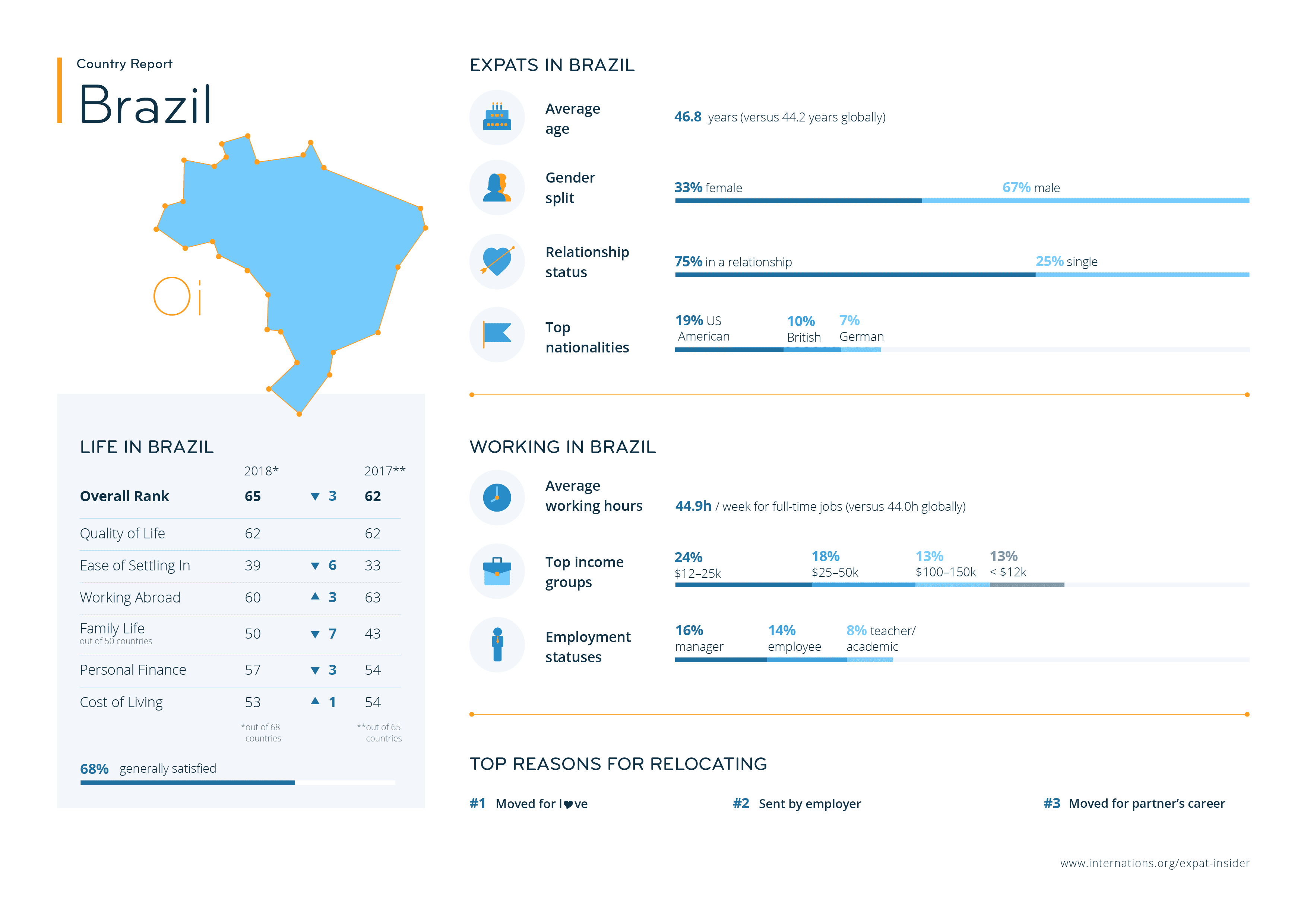Sunny Skies Not Enough to Brighten Expats’ Spirits in Brazil
A friendly welcome is not enough to offset major safety concerns and a poor employment market, which continue to alarm expats in Brazil.
- 47% of expats are mainly friends with local Brazilians.
- The majority rates personal safety negatively.
- 59% expat parents send their children to private school.
- 76% of expats speak Portuguese at least fairly well.
- The cost of living is high, and expats are dissatisfied with their financial situation.

Alarm Bells Continue to Ring
Brazil falls to last place for the Safety & Security subcategory of the Quality of Life Index, with 56% of respondents rating their personal safety negatively — more than six times the global average (9%). Prior to moving, 59% of expats say they considered personal safety in the country to be a potential disadvantage. A Colombian expat highlights the issues with “public security, lack of infrastructure, and social injustice”. It is not just personal safety raising cause for concern, but the political situation, too: 65% of expats consider the political stability to be bad, while only 17% feel this way globally.
Things do not look much better in terms of healthcare — Brazil ranks 58th for the Health & Well-Being subcategory. Just over half of expats (51%) rate the quality of medical care positively, 16 percentage points less than the average worldwide, and only three in ten consider the affordability of it positively (vs. 59% globally).
Despite all of this, 71% of respondents still say they are generally happy with their lives, only five percentage points less than the global average (76%). Expats are also considerably happier with the weather in Brazil than respondents across the globe, with 53% regarding the climate and weather as very good.
Bursting the “Expat Bubble”
For the fifth year in a row, Brazil performs best in the Ease of Settling In Index, though it has fallen six places to rank 39th out of 68 countries in 2018. Brazil comes in above the global average for feeling at home in the local culture — 69% rate this positively in Brazil, compared to 60% globally. The stereotype of expats sticking together does not appear to apply to Brazil, either: more than eight in ten (81%) rate the friendly attitude towards foreign residents positively, and 47% of expats say they are mainly friends with local residents. An Australian expat describes Brazilians as “patient, warm, accepting, less individualistic, and more social”.
Brazilians are patient, warm, accepting, less individualistic, and more social.
It must help that more than seven in ten respondents (73%) say they speak Portuguese fairly/very well, in addition to 6% who are native speakers. However, as 78% do not agree that it is easy to live in the country without speaking the local language, it makes sense why the majority has at least some local language skills. In fact, only 2% say they do not speak it at all, more than six times less than the global average (13%).
Expats Struggle to Settle In in the Workplace
There are no signs of improvement in Brazil’s economy or job market, with the country in the bottom 3 of the Economy & Job Security subcategory for the third year in a row. Almost a quarter of expats (24%) say they considered the economy / labor market to be a disadvantage before moving to Brazil. Once in the country, 62% of respondents rate the state of the economy negatively, and 32% are unsatisfied with their career prospects (vs. a global average of 18% and 25%, respectively). A Portuguese expat claims that “on a professional level it can be frustrating since the work practices are a bit outdated”.
Expat Families Fear for Their Safety
Despite 80% rating the friendly attitude towards families positively — just below the global average of 83% — Brazil still ranks in the bottom 3 for the Family Well-Being subcategory (48th out of 50). Expat parents continue to voice concern about their children’s health and safety — “I am concerned with the level of violence and the opportunities that my children will have for education and careers at a later stage,” states a British expat. Half of the parents rate their children’s safety negatively — five times the global average (10%). A further 30% state they are unsatisfied with their children’s general well-being.
I am concerned with the level of violence and the opportunities that my children will have for education and careers.
More than six in ten expat parents (61%) do not agree that childcare options are numerous or easy to get. The same can be said for education options, as 49% do not agree that these are easily available. Not only are the options for childcare and education unsatisfying, 63% and 67%, respectively, agree that they are not easy to afford either. However, as 59% of parents send their children to local private schools, compared to only 21% globally, this may explain the high costs.
Costs Continue to Climb
Although 72% of respondents say that their household income is enough or more than enough to cover everything they need for daily life (vs. 78% globally), 47% of expats consider the cost of living to be bad. Only 52% are satisfied with their financial situation in general — 15 percentage points less than the global average (67%). Close to two-fifths of respondents (37%) also say their gross yearly household income is 25,000 USD or less, while on average only 27% of expats globally report the same.
Further Reading
Advertisement
Join InterNations
The community for expats worldwide
Download

